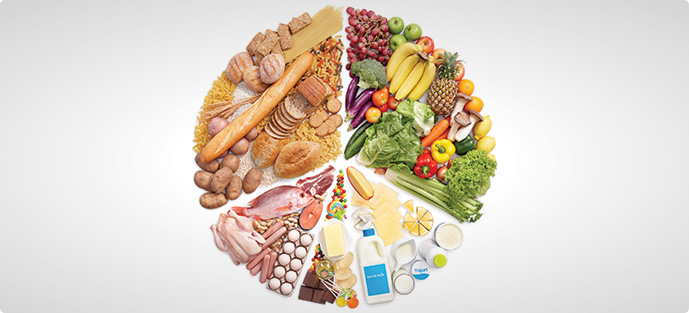
A balanced diet is the right amount of food intake composing of an appropriate mixture of nutrients. Contrary to common belief that certain nutrients are more important than others, research shows that consumption of the right mix of foods in moderation and balance is healthier as our organs and tissues need proper nutrition to function effectively. By balancing and fulfilling the various needs of the body, we live a healthier, longer and stronger life, and have more energy on a daily basis.
| Nutrient | Use in the body | Good sources |
| Carbohydrate | To provide energy. | Cereals, bread, pasta, rice and potatoes |
| Protein | For growth and repair. | Fish, meat, eggs, beans, pulses and dairy products |
| Fat | To provide energy. Also to store energy in the body and insulate it against the cold. | Butter, oil and nuts |
| Minerals | Needed in small amounts to maintain health. | Salt, milk (for calcium) and liver (for iron) |
| Vitamins | Needed in small amounts to maintain health. | Dairy foods, fruit, vegetables |
| Fiber | Roughage to help to keep food moving through the gut. | Vegetables, bran |
| Water | Needed for cells and body fluids. | Fruit juice, milk, water |
The Harvard School of Public Health highly recommends consuming a combination of the aforementioned foods. The composition of a meal depends per individual, but it highlights the need to consume fresh foods from healthy and trustworthy sources, reduce the intake of sugary drinks and increase water consumption, and to not neglect concerns about salt and sodium. Supporting such intake with a fit and active lifestyle can strengthen the chances of maintaining a healthy weight.

Often lack of motivation or lethargy comes in the way of maintaining a balanced diet. Overcoming these will reduce the propensity to catch various diseases, infections, fatigue and poor performance through the day. As with most other nutritional matters, nutritional correction must happen at a very early age; if parents fail to do so, their children will be prone to growth and developmental problems. Physicians or dietitians/nutritionists can provide guidance on dietary intake.
You are about to be redirected to an online retailer’s website. Getz Pharma is not liable for any data exchange on the new website
You will be redirected in 3secs
Disclaimer: "This message (including attachment) is intended solely for the use of the individual or entity whom it is addressed and may contain information that is confidential or privileged. If you are not the intended recipient of this message, you are hereby notified that any use, dissemination, distribution or reproduction of this message is prohibited and that, you must not take any action in reliance on it. E-mail transmission cannot be guaranteed to be secure or error-free as information could be intercepted, corrupted, lost, destroyed, arrived incomplete or contain viruses; therefore Getz Pharma (Private) Limited cannot accept legal responsibility for the contents of this message. If you have received this communication in error, please notify the sender or Getz Pharma (Private) Limited at [email protected] immediately and destroy the original message."
Close